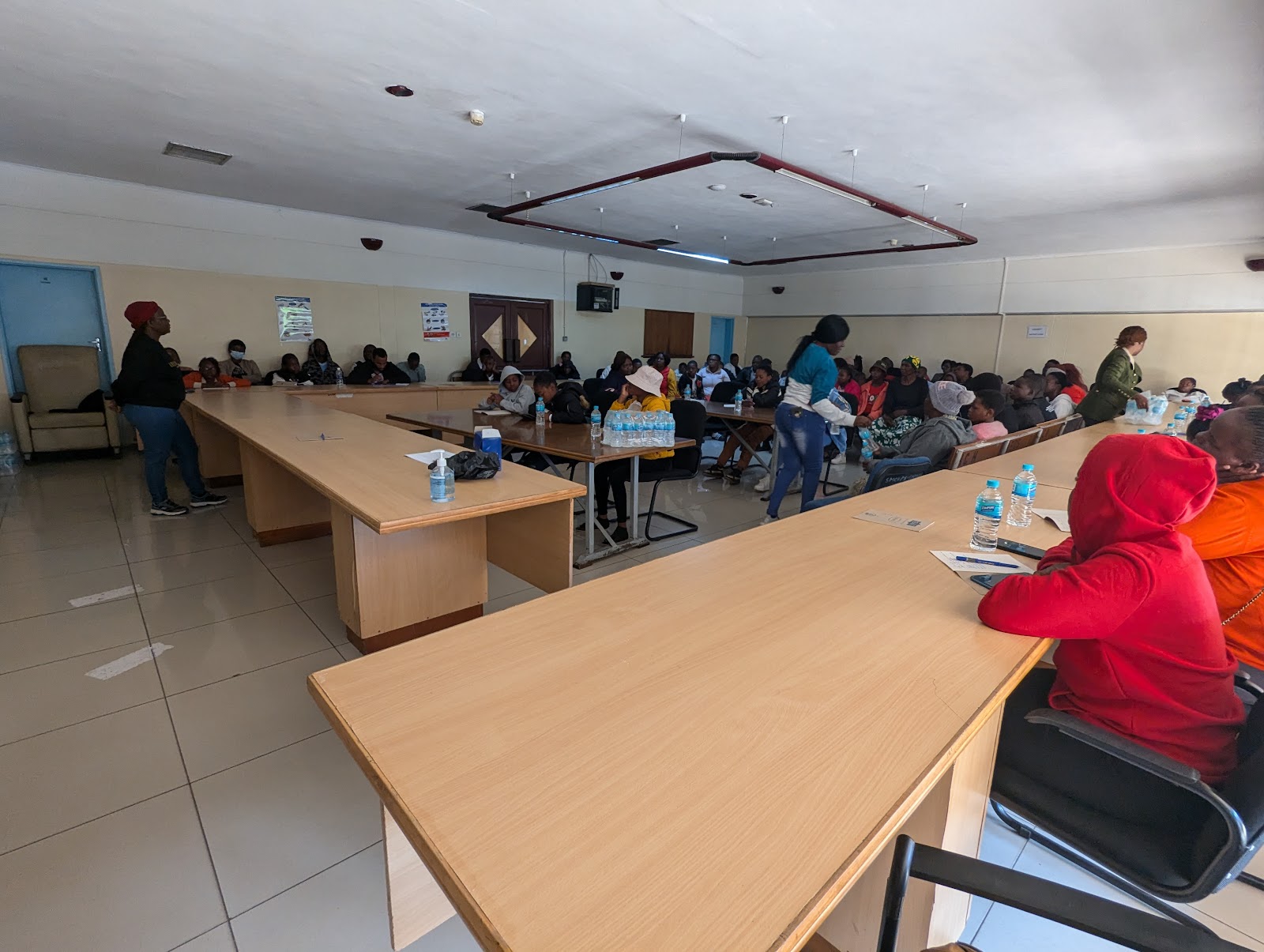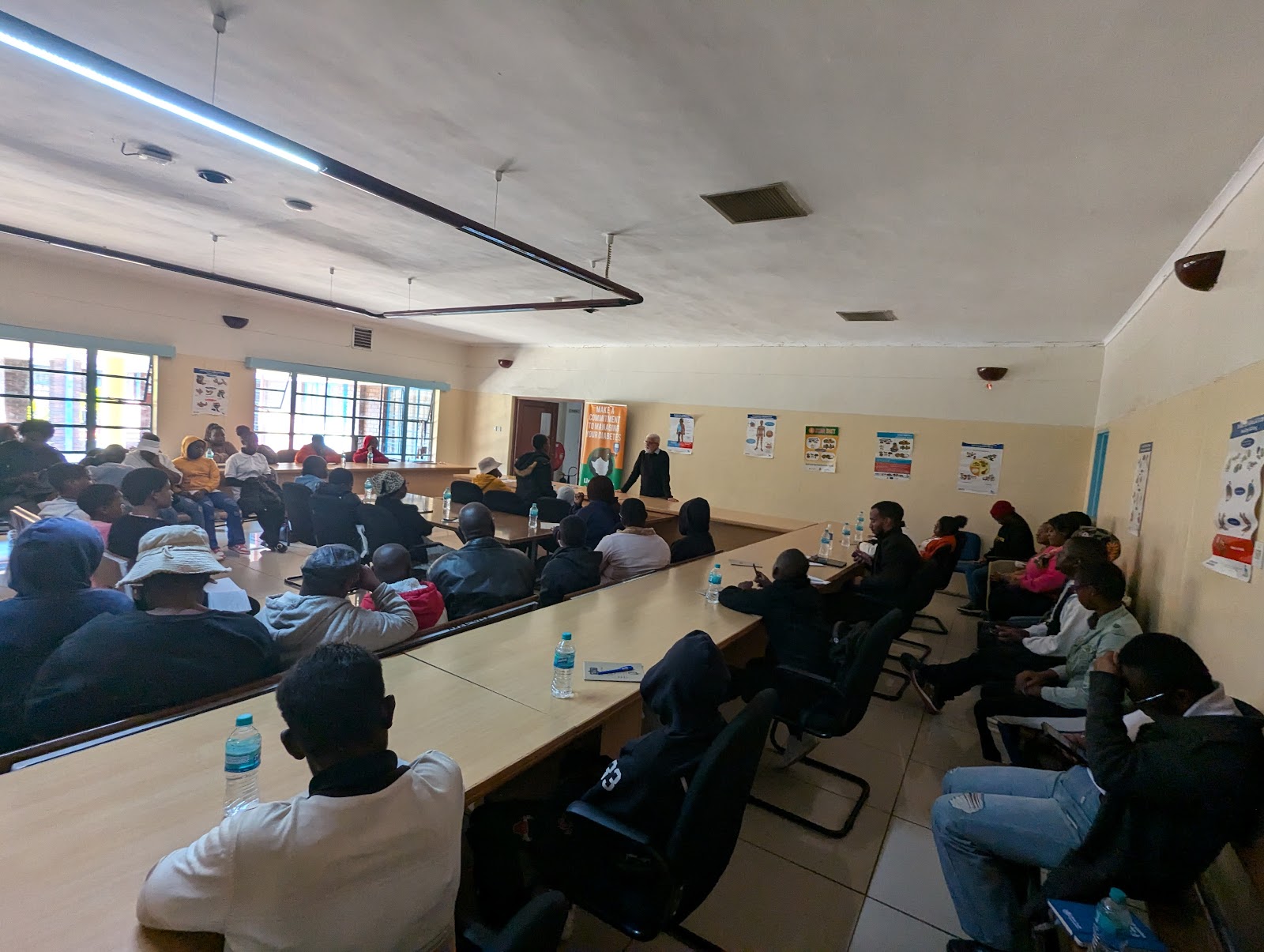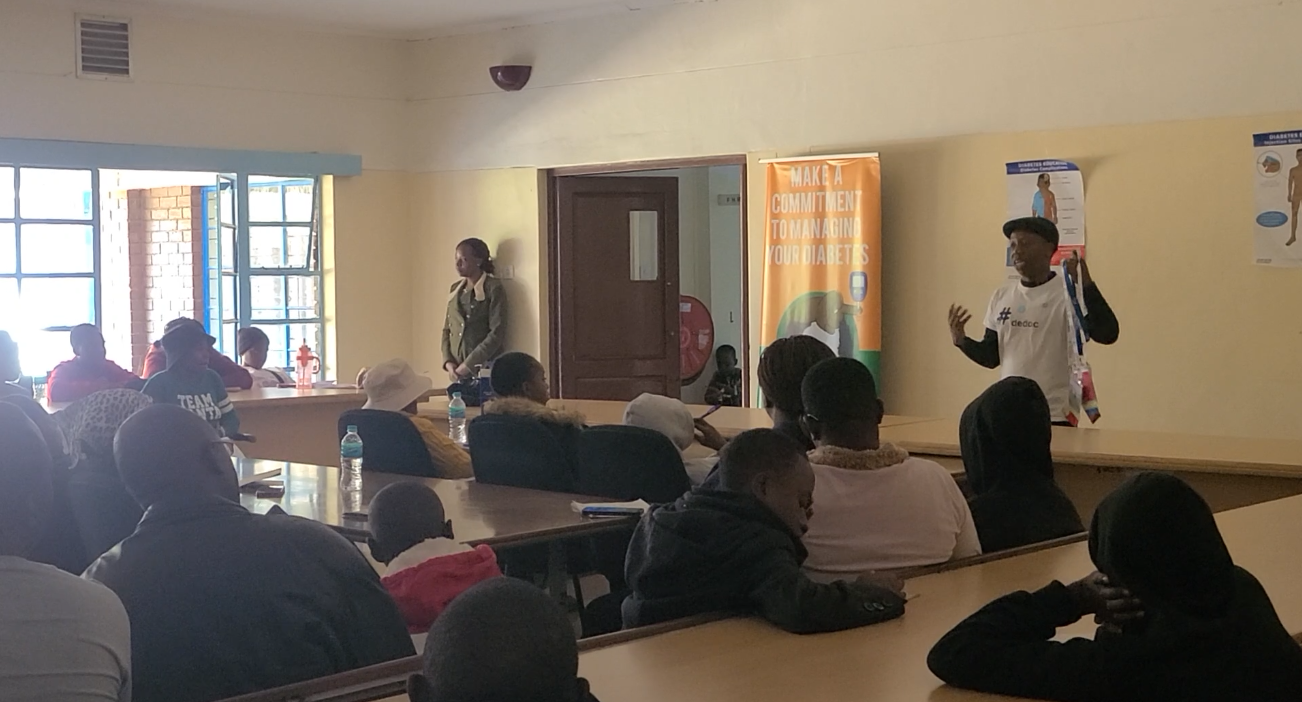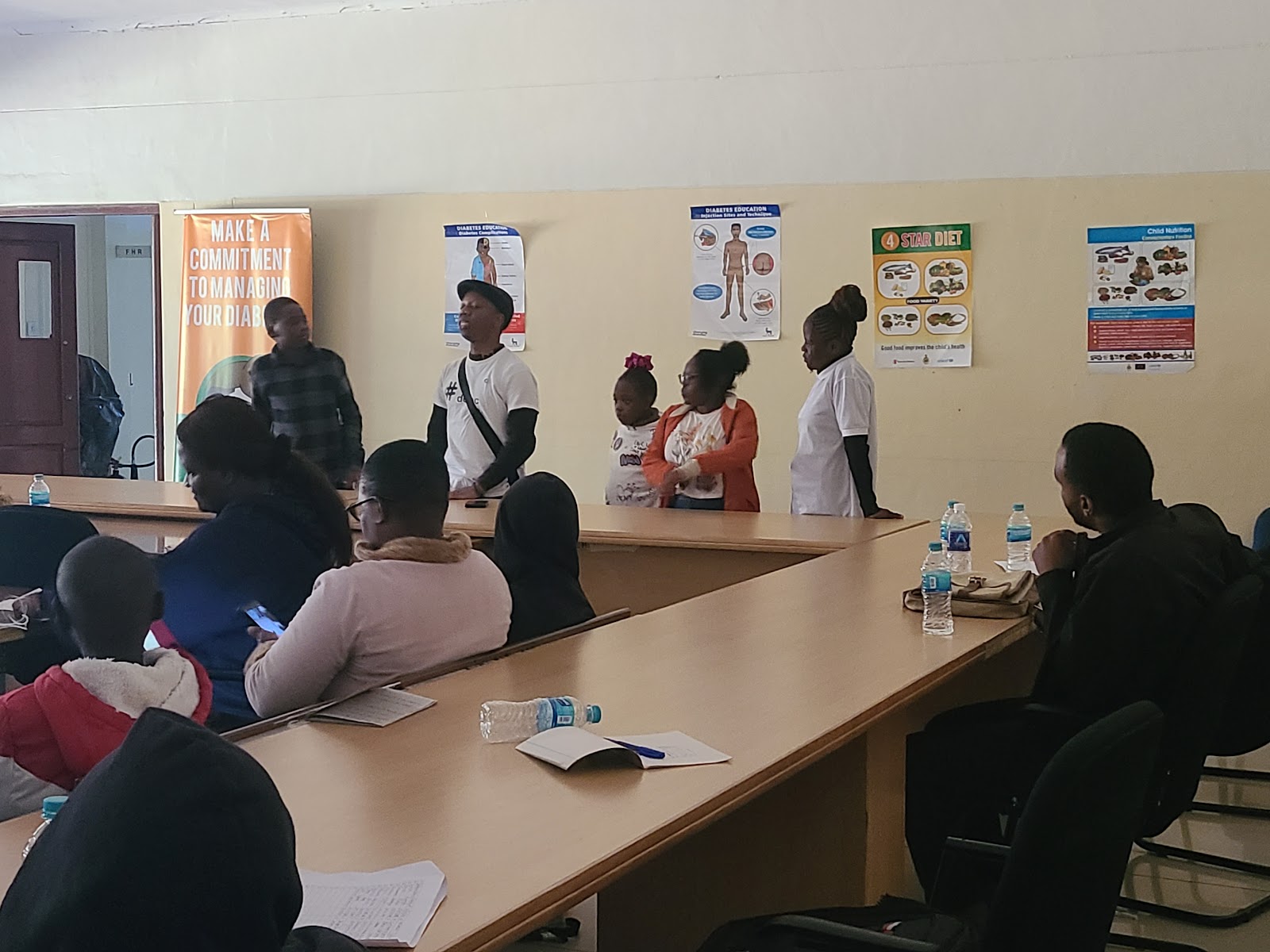Type 1 Diabetes and Wellbeing — Empowering Teens through Knowledge and Shared Experience
On 28 June 2025, we hosted an unforgettable and deeply meaningful workshop at Sally Mugabe Children’s Hospital under the theme “Diabetes and Wellbeing.” This full-day engagement was a collaborative effort between our clinic, the Pediatric Diabetes Clinic from Parirenyatwa Group of Hospitals, and the phenomenal support of #dedoc°, through our remarkable friend and ally, Bastian Hauck. The program brought together teens, young adults, and their families, creating a safe, supportive, and educational space where knowledge, advocacy, and lived experience intersected.
Session Highlights:
Tinotenda Dzikiti opened the session with “T1DM Overview and Lived Experience,” He provided a foundational understanding of type 1 diabetes as an autoimmune condition, highlighting its key symptoms. He reflected on the emotional impact of diagnosis, sharing how isolating the early years were for him—navigating life with T1D while relying mostly on adults living with type 2 diabetes for support, simply because there were no visible young peers with shared experiences. He unpacked the daily realities of diabetes management—from insulin therapy and blood glucose monitoring to navigating stigma and emotional burnout. Tino also shared how those challenges fueled his path into diabetes advocacy, and how doors eventually opened through global platforms. One such opportunity was becoming a #dedoc° voice, which not only gave him a seat at the table but reminded him that our lived experience is powerful. He closed by encouraging participants to remain curious, be compassionate with themselves, seek support, and embrace opportunities to elevate their voices—because they are not alone, and they have something important to contribute to the world.
 |
| Adv. R.N Gororo |
Advocate Rufaro Gororo built upon this by addressing an important and timely session on “Hormonal Changes and Adolescence”—a topic often overlooked yet deeply relevant to teens living with type 1 diabetes. She emphasized how adolescence is not only a period of intense physical growth but also an emotional and psychological transition that significantly affects diabetes management. Rufaro expertly navigated the complexity of hormonal fluctuations and their direct impact on blood glucose levels, insulin sensitivity, and emotional regulation. She created a space where teens could feel seen and validated in their frustrations with unpredictable highs and lows, mood swings, body image issues, and increased peer pressure. Her message was clear: these changes are normal, but awareness, understanding, and support are key to managing them successfully. Her ability to bridge clinical insight with relatable experience made her talk resonate powerfully with both the young participants and their caregivers.
 |
| Adv. H. Koga |
Advocate Heather Koga followed with a heartfelt and insightful presentation on the “Importance of Peer Support and Family Involvement.” Drawing from her own advocacy journey, Heather highlighted how isolation and stigma can deeply affect young people with diabetes—and how having a community of peers, as well as informed and supportive family members, can be transformational. She spoke about the emotional relief that comes from simply knowing “you are not alone,” and underscored the value of safe spaces where young people can share, ask questions, and learn without judgment. Heather emphasized that peer support isn’t just an add-on to care—it’s a critical piece of the puzzle. She also addressed the need for equitable access to care, emotional support, and educational resources, particularly in low-resource settings. Her passion and empathy were unmistakable, and her advocacy empowered participants to not only seek support but to become it for others.
 |
| Dr. P. Mureriwa-Matyanga |
Dr. Mureriwa-Matyanga delivered a compelling and deeply educational session on the fundamentals of Diabetic Ketoacidosis (DKA), emphasizing both its clinical significance and the lived realities behind the condition. She grounded her presentation by inviting participants to share personal experiences with recent DKA episodes, effectively humanizing the condition and reinforcing that DKA is not just textbook knowledge—it is a dangerous and often traumatic experience that many young people with T1D have faced. This approach helped participants connect more deeply with the topic, recognizing DKA as an urgent and life-threatening complication requiring immediate hospital intervention. She explained that DKA occurs when there is no insulin—or inadequate insulin—in the body, and can also be triggered by serious infections. Symptoms such as extreme tiredness, nausea and vomiting, abdominal pain, mental confusion, and fogginess were outlined to enhance early recognition. Dr. Mureriwa-Matyanga further involved her nursing colleagues who outlined key principles and procedures in DKA management from a hospital perspective, including testing for ketones, administering insulin therapy, and providing intensive, around-the-clock monitoring to stabilize the patient. The team emphasized that managing DKA demands sleepless vigilance from healthcare professionals due to the acute danger it presents. This session served as a critical call-to-action, reminding everyone that prevention, early detection, and proper education about DKA can save lives.
 |
| GP: Dr. Kusuta |
Dr. Kusuta addressed “Transition from Pediatric to Adult Care,” a topic that sparked robust engagement. Teens shared their hesitancy toward adult clinics due to attachment with pediatric teams, fear of being misunderstood, and lack of adolescent-centered spaces. Concerns included language used by clinicians, fears of losing free insulin (for LFAC beneficiaries), and reluctance to be grouped with older adults. Dr. Kusuta acknowledged these anxieties and stressed the need for structured transition support, such as dedicated adolescent clinics and preparatory workshops with both pediatric and adult teams. A parent also shared a powerful story about judgmental clinical notes, reinforcing the need for compassionate communication.
 |
| Dietitian, Mr. Savheri |
Mr. Savheri, a registered dietitian, explored Diabetes and Nutrition, focusing on a practical and culturally relevant approach to diet: understanding low- and high-GI foods, limiting saturated fats and processed foods, and prioritizing balanced meals. He discouraged overreliance on supplements and emphasized the importance of consulting a dietitian at key stages—especially at diagnosis, during pregnancy, or before engaging in rigorous physical activity.
 |
| Sr. Rwizi |
Sister Rwizi and Dr. Ticklay offered an insightful session on Monitoring and Insulin Administration Techniques, emphasizing best practices for injection, rotation of sites, and the importance of proper insulin storage and handling. They stressed that insulin should never be frozen, as it loses its efficacy, and highlighted the need for using small syringes, maintaining hygiene, and ensuring consistency in monitoring. Dr. Ticklay further encouraged participants to continue visiting their clinics for regular reviews or whenever things don't seem right, reinforcing that managing diabetes is a daily responsibility. “You live with it 24/7,” he explained, “and we as healthcare professionals are here to guide and support you to live well.” He reminded participants to regularly measure their blood glucose levels and bring their readings to clinic appointments, as this data helps clinicians tailor treatment to each person’s unique needs. The session empowered attendees to take an active role in their own care while leaning on their health teams for expert support.
 |
| Dr. I. Ticklay |
Walter Beta, our Clinical Psychologist, delivered an engaging and emotionally resonant session on the psychosocial issues surrounding life with type 1 diabetes. He unpacked the mental toll the condition can have, especially during adolescence—highlighting challenges like burnout, social isolation, stigma, peer pressure, fear of losing control, and the pressure to maintain perfect numbers. Walter emphasized that the longer someone lives with diabetes, the more layered the emotional experience becomes, and reminded participants that it’s not only okay but encouraged to seek counselling—not just when there’s a crisis, but as a healthy form of ongoing support. He closed with an interactive diabetes-themed bingo game that brought laughter, connection, and reflection, making his session both therapeutic and memorable.
 |
| Walter Beta, Clinical Psychologist |
Participant Feedback:
- Improved understanding of DKA and the reassurance that they’re not alone.
- Dietary management remains a challenge and needs continued guidance.
- Transitioning into adult care is filled with uncertainties and needs structured support.
- Shared experiences gave a sense of belonging and hope.
- Peer support and community learning are essential.
Our deepest thanks go to every participant who took part in this event. Your presence, questions, and reflections made this workshop truly special. We are grateful to our speakers and volunteers for lending their expertise and time. A special thanks goes to Mrs. Pfumbi, our exceptional caterer, whose flexibility and excellence ensured no one went hungry, even with double the expected turnout.
 |
| Vote of Thanks |
We extend our heartfelt gratitude to Bastian Hauck and #dedoc° for their generous support, which made it possible to provide all participants with water, snacks, a nutritious lunch, and a token of appreciation for our amazing speakers.
Until next time: We don’t just manage diabetes. We rise with it.


.png)


Comments
Post a Comment